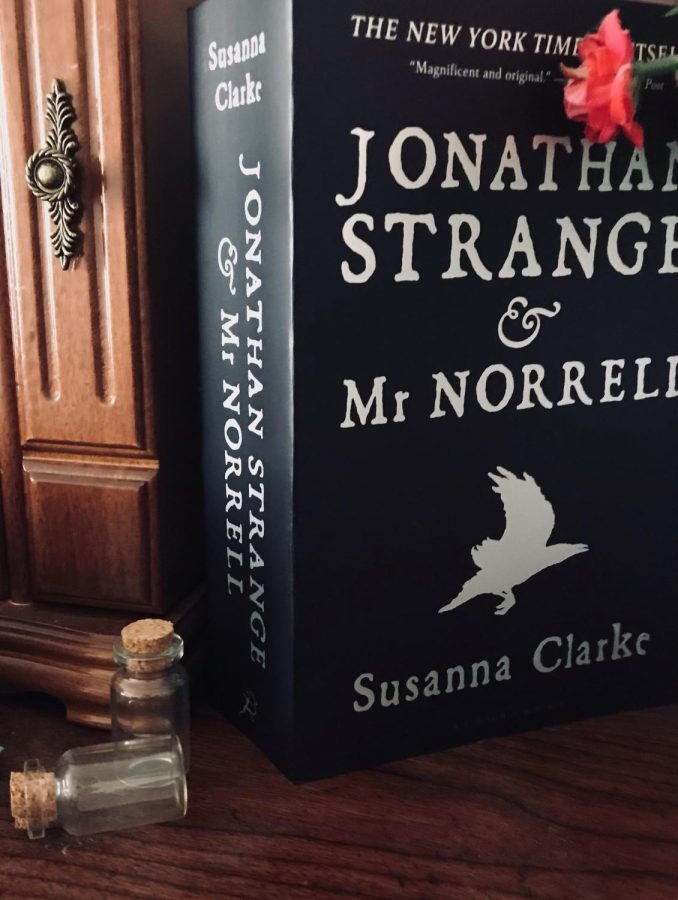Yu’s Reviews: Clarke’s Fantasy Novel ‘Jonathan Strange & Mr. Norrell’ Exceeds Expectations
Jonathan Strange & Mr. Norrell combines aspects of both classic and fantasy literature.
Despite reading a relatively large amount, it is very difficult for me to say that I have a favorite book. But, I am surprisingly confident to say that Jonathan Strange & Mr. Norrell, written by Susanna Clarke, has become one of my favorites. Even despite its length, its intricate worldbuilding and multifaceted characters were so immersive to the point anyone could lose themselves in the plot and setting— something relatively rare during the often stressful or busy times in high school.
Jonathan Strange & Mr. Norrell is set in an alternate Regency Era England where magic had once flourished in centuries past. Mr. Norrell is the self-proclaimed last practical magician in England, and proves himself by reviving the fiancée of an important politician; however, he is highly aloof and unwilling to actually teach anyone else his knowledge. Some time later, he meets the young Jonathan Strange, who is led to believe that he should become a magician after several unusual experiences. Though he originally starts out as Mr. Norrell’s apprentice, their differing beliefs on the fundamentals of magic, the purpose of it, and the risks they are willing to take for its advancement drive them apart. Meanwhile, the sinister influence of a gentleman faerie looms over both of them, affecting the lives of both of their friends and allies.
The style of the book brings to mind the writing of classic English writers, with Clarke having stated that she drew direct inspiration from Jane Austen and Charles Dickens for pacing and style. The narrator’s wit and subtle sarcasm adds a sense of humor, even to otherwise very serious situations. In domestic settings, there is a hint of satire regarding ridiculous social norms from the Regency Era, while descriptions of nature immerse the reader in a vivid setting either foreboding or fantastical.
Clarke’s worldbuilding is unparalleled to many other fantasy novels. Through the use of footnotes referencing old magical texts or interesting “historical” anecdotes that the scholars Norrell and Strange would have been highly knowledgeable of, the reader is very easily immersed and can catch up to the intricacies of the world without the need of a giant exposition chapter. As Strange himself learns of the history, so does the reader alongside him. The knowledge required to understand the magic of their world comes naturally and is not forced at all. The magic system draws on real-world British folklore, especially in its depiction as something more wild and otherworldly rather than as a common and predictable tool.
The moral complexity of the characters adds more depth and intrigue to them. Both Strange and Norrell are actually not strictly morally “good” characters, as they both have moments of incredible selfishness and shortsightedness that cause harm to others. Norrell is extremely possessive and elitist, buying and hoarding every single book of magic so that no one else can surpass his knowledge. Though Strange initially appears to be the more likable person due to his outward friendliness, his ambition and devotion to the study of magic leads him to take unmeasurable risks, and he sometimes acts unintentionally dismissive to his wife in pursuit of his goals.
There is actually a level of social commentary through characterization that is very interesting. Although both Norrell and Strange are “gentlemen” and therefore upper class, they are not the only ones in contact with magic. For instance, Childermass, Norrell’s servant, learned a fair amount of magic on his own without instruction, but Norrell is either unaware of or pretends to be ignorant of his abilities because of his prejudices towards the lower classes. Norrell also actively tries to prevent the poor (and women) from learning magic, and he represents an older, more conservative train of thought both academically and politically. Although Strange is much more open than him, he still receives significantly more privilege than those who are not well-off, white, or male, and he does not seem fully aware of it. Interestingly enough, Norrell and Strange are not ultimately the most directly pivotal characters despite their magic being the most visible. Despite being silenced or overlooked the most often in either history or historical fiction, a few of the characters who actually make the biggest impact do not fall into all the categories of being white, male, or wealthy.
Overall, this book really exceeded expectations, and deserves a lot more attention than what it already has. It manages to combine so many aspects of storytelling that both historical and fantasy writers would strive towards.
